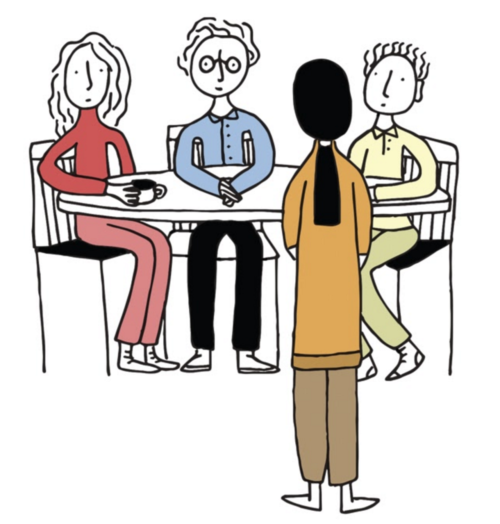
Three days ago in India, my aunt’s servant girl, Zeba, died from a fever. My mother whispered this to me at a crowded reception, watching my face for an inevitable reaction. I was holding a plate of miniature appetizers, and in the next few moments, I directed all my attention towards steadying it.
As the party progressed, I continued to smile at the people mingling around me, ignoring the flush spreading over my body, the burning frustration underneath my skin, the nauseating anger rising towards my aunt.
It could have happened to any of them. They were all sick, my mother said focusing her gaze just above my eyes. A nearby group made a toast, their wineglasses clinking loudly. Yes, of course. It is entirely coincidental that my relatives recovered within days, and somehow, only the servant working for them was not strong enough. To be fair, if you take the help to your annual doctor’s visit, who will make dinner?
‘Servant’ is too generous a term for who Zeba was, but ‘the help’ doesn’t fit either. So what can we call her? At the very least, someone who slept under my aunt’s bed without a moment of free time. A girl who was screamed at for forty-five minutes for eating a spoonful of jam. Who ate as if in shame, hunched under the kitchen counter after serving the family. Someone who was slapped by my aunt once, twice, that’s enough counting. Owner of the sweetest smile you have ever seen. A child who was fourteen when she died.
Child labor, while highly illegal in the United States, is culturally acceptable in South Asia. An enormous fraction of the population lives in poverty, so many children start providing for their families as soon as possible. Zeba was one of them, and she was seen as fortunate for earning a steady income working for a good Indian family. In fact, my aunt explained that she saw Zeba as her own daughter. She is a good girl, my aunt said. I just have to give her scoldings sometimes, so she won’t make mistakes.
I’m sure that’s what my aunt told Zeba’s family, who lived an overnight train away from Delhi, as she assured them that she was happy, healthy, and learning every day. She certainly was all of those things. Learning her place by serving double helpings of ice cream to our family, barred from touching any herself. Healthy, like when she wouldn’t eat after a scolding and nobody noticed. And happy.
It’s possible that Zeba might have been treated more harshly in another household. Servants in South Asian culture have few to any rights, and the lack of established standards for their treatment creates enormous room for the employer’s jurisdiction. Though freedom to treat servants as they wish allows for mistreatment, it also allows for greater kindness than a defined role might provide.
One of my uncles, my aunt’s brother in law, has a twenty-two year old servant named Maia. She helps his wife make meals and care for their son, but primarily spends time keeping them company. Maia sits with the family at dinner, and is given a respected voice in most conversations. Guests who treat her poorly are not welcome in their home.
My grandmother, who lives in a town close to Delhi, has become too old for daily work. A family of local girls work with her to take care of household chores, and in return, my grandparents look after them. The girls began reading the Hindi newspaper out loud to my grandmother several years ago, and still take turns every morning. Their voices used to be imperceptible as they stumbled through the headlines, but now they read emphatically, freely voicing their opinions on bits of news. The silence of my grandmother’s courtyard is constantly broken by laughter, friendly banter, and narrations of everyday encounters. Recently, my grandfather helped the oldest girl gain admission to an engineering school. When she graduates, her new job will drastically improve her family’s circumstances, also setting a new standard of living for future generations. My grandparents are deeply religious, and believe that all people will be viewed equally in heaven. They are sure that those who abuse their positions to commit moral wrongdoings onto others will later be brought to justice.
My aunt and uncle said that Americans do not understand how Indian society works, and so we were not capable of understanding their servant girl. But my grandmother, who was born and raised in India, has always looked at Zeba with pain.
Your aunt did not intend this to happen, my mother said, walking back from the reception. Vibrant leaves had already started falling, leaving my favorite Princeton trees bare. It is true, my aunt did not commit this last wrong. But she had absolute power over her, and she exercised it with an incomprehensible moral compass. Under her watch, Zeba’s life was difficult at best, cruel at worst. To my relatives, there was a clear difference between servants and children, and Zeba, even from age nine, had always been the former.
My relatives tell me that my aunt has taken Zeba’s death very hard, and is inconsolable. Perhaps she is worried that she can’t find another child servant soon enough. Perhaps she is overwhelmed by guilt, but can’t explain exactly why. After all, she did nothing wrong. Perhaps, and I think this holds the most truth, she is worried that she will be blamed for her mistreatment of this child.
Perhaps she is right.

Leave a Reply